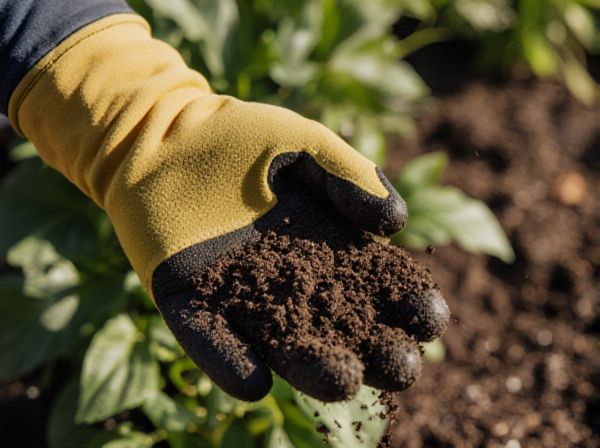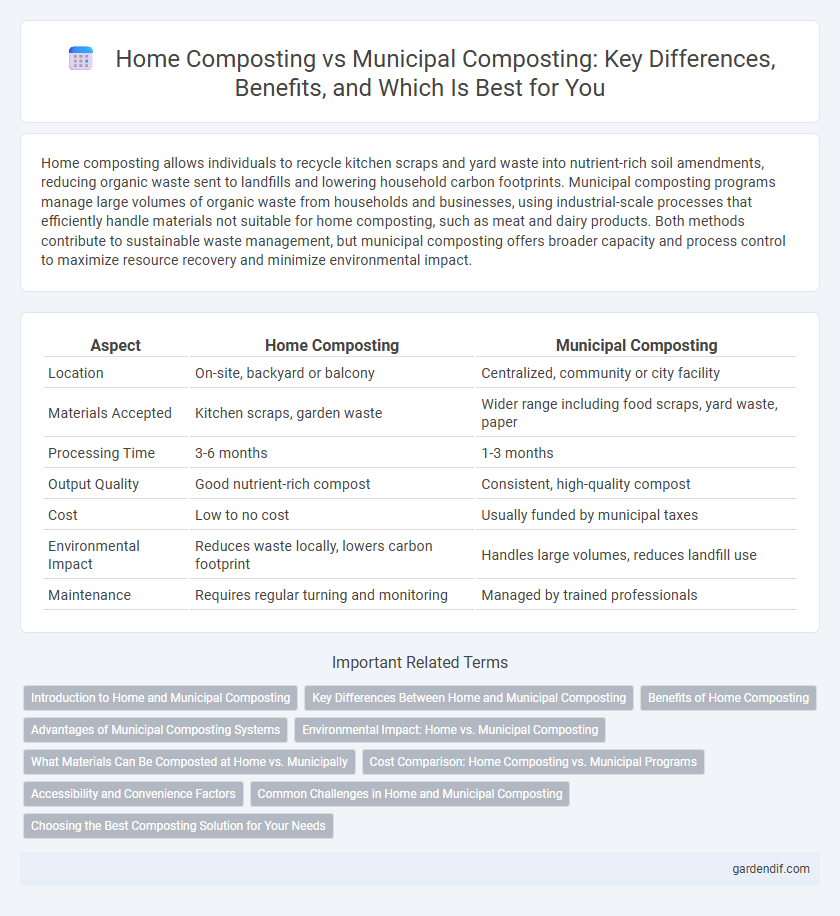
Home Composting vs Municipal Composting Illustration
Home composting allows individuals to recycle kitchen scraps and yard waste into nutrient-rich soil amendments, reducing organic waste sent to landfills and lowering household carbon footprints. Municipal composting programs manage large volumes of organic waste from households and businesses, using industrial-scale processes that efficiently handle materials not suitable for home composting, such as meat and dairy products. Both methods contribute to sustainable waste management, but municipal composting offers broader capacity and process control to maximize resource recovery and minimize environmental impact.
Table of Comparison
| Aspect | Home Composting | Municipal Composting |
|---|---|---|
| Location | On-site, backyard or balcony | Centralized, community or city facility |
| Materials Accepted | Kitchen scraps, garden waste | Wider range including food scraps, yard waste, paper |
| Processing Time | 3-6 months | 1-3 months |
| Output Quality | Good nutrient-rich compost | Consistent, high-quality compost |
| Cost | Low to no cost | Usually funded by municipal taxes |
| Environmental Impact | Reduces waste locally, lowers carbon footprint | Handles large volumes, reduces landfill use |
| Maintenance | Requires regular turning and monitoring | Managed by trained professionals |
Introduction to Home and Municipal Composting
Home composting involves individuals managing organic waste in small-scale bins or piles, turning food scraps and yard waste into nutrient-rich compost for personal use. Municipal composting operates on a larger scale, typically managed by local governments or waste services, processing diverse organic waste from households and businesses with industrial equipment. Both methods aim to reduce landfill waste and produce valuable soil amendments but differ in scope, control, and processing time.
Key Differences Between Home and Municipal Composting
Home composting involves small-scale organic waste decomposition using backyard bins or piles, resulting in nutrient-rich compost suitable for garden use. Municipal composting operates on a large scale, processing diverse organic waste, including food scraps and yard trimmings, with advanced technologies that accelerate decomposition and ensure pathogen reduction. Key differences include scale, temperature control, processing time, and the range of accepted materials, with municipal facilities capable of handling greater volume and complexity compared to home systems.
Benefits of Home Composting
Home composting reduces household waste by diverting organic materials from landfills, thereby lowering methane emissions and contributing to environmental sustainability. It enriches garden soil with nutrient-rich compost, improving plant health and water retention while reducing the need for chemical fertilizers. Engaging in home composting fosters environmental awareness and cost savings by minimizing waste disposal fees and purchasing soil amendments.
Advantages of Municipal Composting Systems
Municipal composting systems efficiently handle large volumes of organic waste, diverting significant amounts from landfills and reducing greenhouse gas emissions. These centralized facilities employ advanced technologies such as aeration and temperature control to accelerate decomposition and ensure pathogen destruction. Public composting programs also promote community engagement and provide access to compost for agricultural and landscaping use, enhancing soil health on a broader scale.
Environmental Impact: Home vs. Municipal Composting
Home composting reduces carbon emissions by eliminating transportation and minimizes landfill waste through direct organic matter recycling. Municipal composting processes larger volumes, promoting efficient waste management and enabling advanced technologies for pathogen control and greenhouse gas reduction. Both methods contribute to soil enrichment and carbon sequestration, yet home composting offers localized environmental benefits with lower energy consumption.
What Materials Can Be Composted at Home vs. Municipally
Home composting typically accepts kitchen scraps such as fruit and vegetable peels, coffee grounds, eggshells, and yard waste like grass clippings and small branches. Municipal composting programs can process a broader range of materials including meat, dairy, bones, and food-soiled paper, which require higher temperatures to break down safely. Understanding the material limitations of each method is crucial for effective composting and minimizing contamination.
Cost Comparison: Home Composting vs. Municipal Programs
Home composting significantly reduces waste disposal costs by utilizing backyard bins and kitchen scraps, eliminating fees associated with waste hauling. Municipal composting programs, while offering convenient curbside pickup and professional management, often include service charges or increase municipal taxes to cover operational expenses. Over time, home composting presents a more cost-effective solution for individuals focused on sustainability and budget-conscious waste management.
Accessibility and Convenience Factors
Home composting offers unparalleled accessibility, allowing individuals to recycle organic waste directly in their backyard, eliminating the need for transport or adherence to municipal collection schedules. Municipal composting provides convenience by handling large volumes of organic materials with professional management, reducing household responsibilities and overcoming space limitations faced by urban dwellers. Both methods enhance waste diversion but differ significantly in ease of access and user involvement based on lifestyle and living arrangements.
Common Challenges in Home and Municipal Composting
Home composting often faces challenges such as maintaining the right balance of green and brown materials, managing pests, and controlling odor due to limited space and inconsistent aeration. Municipal composting facilities encounter difficulties including contamination from non-compostable waste, high operational costs, and the need for large-scale sorting and processing infrastructure. Both methods require effective moisture control and temperature regulation to ensure efficient organic matter decomposition and pathogen reduction.
Choosing the Best Composting Solution for Your Needs
Home composting offers personalized control over organic waste breakdown, allowing for nutrient-rich soil amendment tailored to small-scale gardens, while municipal composting facilities handle larger volumes with advanced processing technologies that ensure broad environmental benefits. Selecting the best composting solution depends on factors such as available space, waste quantity, time commitment, and environmental impact priorities, with home composting suited for minimal waste and active management, and municipal composting ideal for convenience and large-scale sustainability. Evaluating these criteria helps optimize composting efficiency, reduce landfill contributions, and support circular waste management practices.
Home Composting vs Municipal Composting Infographic

 gardendif.com
gardendif.com